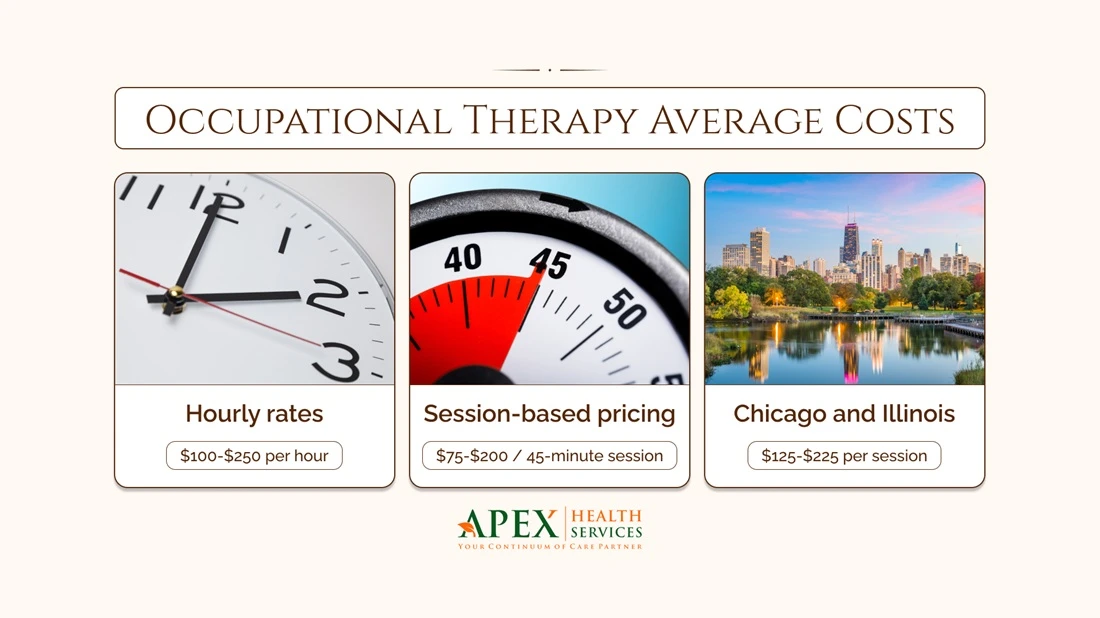You might encounter an occupational therapy price range from $50 to over $400 per hour. This dramatic variation often leaves individuals wondering about the true cost of quality care.
At APEX Home Health Care, we provide comprehensive at-home occupational therapy services throughout Illinois, helping patients regain independence and improve their quality of life.
Let's explore what drives these costs and how you can make informed decisions about occupational therapy for yourself or your loved ones.
Typical Occupational Therapy Pricing Structures
Occupational therapy, a vital home health service that helps people perform daily activities after injury or illness, comes with different pricing models.
The way occupational therapists charge for their services varies significantly across different settings and payment models. Here's what you can expect:
- Hourly rates: Most private practice occupational therapists charge between $100-$250 per hour.
- Session-based pricing: Many clinics offer 45-minute sessions ranging from $75-$200.
- Package deals: Some providers offer bundles of 10-12 sessions at discounted rates, typically saving 10-15 percent.
- Home therapy cost structures: In-home visits generally add $25-$50 to standard rates.
- Hospital-based therapy: Often billed at higher rates ($150-$400), but may have better insurance coverage.

The average occupational therapy visit cost in the United States ranges from $150-$175, though this figure shifts based on numerous factors below.
What's Typically Included in Your Therapy Investment?
Your occupational therapy program encompasses far more than just face-to-face treatment time. Here's what quality providers include:
Core Treatment Components
Professional occupational therapy services include a comprehensive evaluation of your abilities and challenges. Each session incorporates hands-on treatment techniques, specialized equipment usage, and personalized skill-building exercises. Your therapist documents progress meticulously and adjusts the treatment plan based on your improvement trajectory.
- Initial and ongoing assessments of functional abilities
- Hands-on therapeutic interventions during each visit
- Training in adaptive techniques for daily activities
- Medication management support, including organization systems and safe handling strategies
- Progress documentation and treatment plan adjustments
- Communication with your physician and care team
Equipment and Materials
Many people don't realize their therapy costs cover access to specialized equipment. This includes adaptive devices for daily living, sensory integration tools, fine motor skill development materials, and cognitive rehabilitation resources. Some clinics also provide take-home materials to support your progress between visits.
- Use of clinic equipment during sessions
- Recommendations for adaptive devices (though purchase costs are separate)
- Exercise materials and handouts for home practice
- Access to specialized therapy tools and technology
- Educational resources for family members

Additional Services Often Available
Home health providers may provide supplementary services that enhance your occupational therapy outcomes, such as:
- Coordination with physical therapy and speech therapy teams
- Family caregiver training and support
- 24/7 care team availability for questions and concerns
- Collaboration with nursing staff for comprehensive care
- Specialized programs for chronic conditions like stroke, Parkinson's, or diabetes
- We Honor Veterans program participants receive specialized veteran care
What's Not Typically Included
We’ve outlined what’s included, but it's important to know what occupational therapy costs don't cover:
- Prescription medication costs (though medication management training is included)
- Durable medical equipment purchases for home use
- Transportation to and from therapy appointments
- Additional medical services outside the occupational therapy scope
- Specialized braces or orthotics (billed separately)
Professional Expertise and Planning
Behind each therapy session lies extensive preparation. Your occupational therapist will review your case, research evidence-based interventions, coordinate with other healthcare providers, and develop customized home exercise programs. This professional planning significantly impacts your recovery outcomes.

Factors Influencing Your OT Price
Several key elements determine what you'll pay for occupational therapy services:
Geographic Location Impact
Location dramatically affects pricing.
In Chicago and surrounding Illinois areas, for example, occupational therapy costs typically range from $125-$225 per session.
Urban centers like downtown Chicago command premium rates, while suburban practices often charge 15-20 percent less. Rural areas may have lower prices, but fewer specialized providers are available.
Provider Qualifications and Specialization
Occupational therapists with advanced certifications or specialized training command higher fees. For example, therapists certified in hand therapy, pediatric specialization, or neurological rehabilitation often charge 20-30 percent more than general practitioners. Years of experience also factor into pricing, with seasoned professionals typically charging premium rates.
Treatment Setting Variations
Where you receive therapy significantly impacts costs. Hospital outpatient departments generally charge the highest rates, followed by private clinics. Home health services fall in the middle range, while community health centers often offer the most affordable options. Each setting offers different advantages in terms of equipment availability and convenience.
Insurance Coverage Complexities
Your insurance plan plays a crucial role in determining out-of-pocket costs. Some plans cover occupational therapy comprehensively, while others require substantial copayments or limit the number of covered visits. Medicare typically covers medically necessary occupational therapy, but may have annual caps. It’s vital to verify your coverage, as private insurance benefits vary widely.
Smart Strategies for Managing Occupational Therapy Costs
Making occupational therapy affordable requires strategic planning:
- Maximize insurance benefits: Schedule your therapy early in the calendar year when deductibles reset and benefit limits refresh.
- Ask about sliding scale fees: Many providers offer income-based pricing for qualified individuals.
- Consider group therapy sessions: Some conditions benefit from group treatment at reduced individual costs.
- Explore telehealth options: Virtual occupational therapy sessions often cost 20-30 percent less than in-person visits.
- Investigate community resources: Local hospitals, universities with OT programs, and nonprofit organizations sometimes offer reduced-cost services.
- Bundle your sessions: Purchasing multiple sessions upfront often yields significant discounts.
- Time your treatment strategically: Some providers offer off-peak pricing for midday or early morning appointments.
Consider that investing in occupational therapy early often prevents more costly interventions later. Many patients find that the improved quality of life and increased independence make the investment worthwhile, especially when using these cost-saving strategies effectively.
FAQ
Your Path to Quality, Affordable Occupational Therapy Starts Here
Whether you're recovering from injury, managing a chronic illness, or seeking support for a child with developmental needs, the right occupational therapy program transforms lives.
Ready to explore occupational therapy options that fit your budget and needs? APEX Home Health Care offers comprehensive home-based therapy services throughout Chicago, all tailored to your situation. Contact us today to discuss how our experienced team can support your journey to improved function and independence!

.svg)
.webp)


